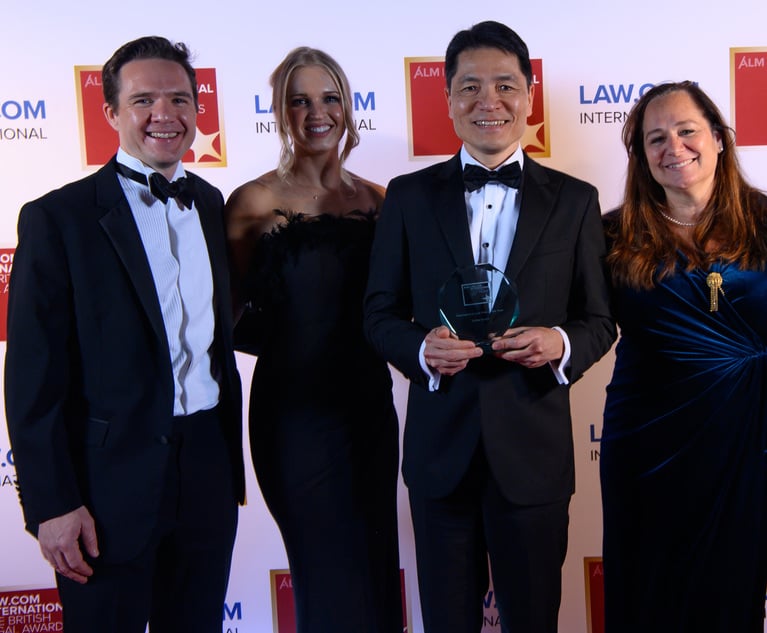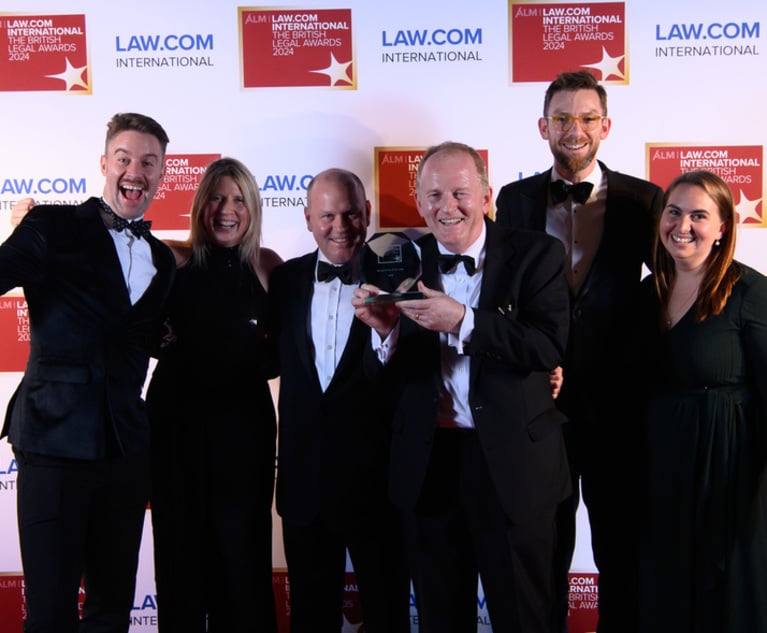DLA Piper Lures US and Latin America Finance Partner From Akin Gump
Dino Barajas will co-chair the firm's U.S. projects and infrastructure practice and its Latin America corporate and finance practice. Here, he shares some insights on what he expects to see in the region as the coronavirus ravages economies across the globe.
March 30, 2020 at 06:53 PM
4 minute read
DLA Piper has snagged a finance partner from Akin Gump Strauss Hauer & Feld for its Los Angeles practice focused on U.S. projects, infrastructure and Latin America corporations.
Dino Barajas will serve as co-chair of the firm's U.S. projects and infrastructure practice and its Latin America corporate and finance practice. Currently, Barajas said his practice is equally focused on client activity throughout the U.S. and Latin America.
Barajas has spearheaded the Latin America practices at three international law firms and is recognized as one of the leading project finance and Latin America practitioners by various industry rankings.
His experience includes representing lenders, investors and developers in domestic and international project financing matters for the energy, power, infrastructure and commercial industries.
DLA Piper said it has been keen to expand in Latin America because the region represents one of the fastest-growing markets for international companies from a trade and development perspective.
Latin American countries have increased their trade volume with European and Asian trading partners in recent years and have secured new trade agreements as a counterbalance to potential shifts in trade volume with the U.S.
At the same time, multinational companies have sought opportunities to expand their local market share throughout Latin America.
Barajas said he was drawn to DLA Piper's full-service network of offices in each of the key Latin American jurisdictions that allows it to compete with premiere local firms across numerous industries.
"Given DLA Piper's global footprint in key markets throughout the world, the firm is uniquely positioned to provide clients with a single point of contact to transact business throughout the region while at the same time providing the cost efficiencies of working with a single team, thus avoiding redundancies in review by multiple unrelated law firms," he said.
Countries across the Americas are bracing for recessions as COVID-19 spreads and economic activity contracts. In this context, Barajas said he expects mergers and acquisitions and potential restructurings to account for the bulk of his work in the near future.
Here are some of his key observations and expectations amid the COVID-19 infections rise:
What do you see keeping your practice busy over the six to 12 months?
The effects of an economic downturn will likely reverberate throughout many industries and may force companies to make difficult decisions as to which assets to prioritize and to which assets capital will be redirected. As with economic downturns in the past, potential investors with available cash reserves may find attractive assets for sale, but a determining factor in success may be their ability to close transactions quickly and efficiently without sacrificing thorough due diligence.
Fire sales, which may occur if the global economy worsens, harm both potential sellers and buyers because sellers may be forced to sell their assets at rock-bottom prices on a rushed basis, and buyers in those transactions are simply making educated bets on assets that may later prove to have unforeseen liabilities that would have otherwise been discovered had the parties had more time to close the transaction.
Restructurings will likely also become more prevalent as companies continue to experience a deterioration of their revenues while having to meet fixed operating costs and outstanding debt obligations. A quiet surveying of potential acquisition targets has already begun across numerous industries.
What do you expect to happen with infrastructure projects?
The infrastructure sector may experience a temporary slowdown as investors and developers assess the long-term viability of projects currently under construction. Developers may begin prioritizing among their various developments and redirecting scarce capital to those projects they deem the most likely to preserve value.
Early-stage developments will likely be mothballed or sold in order to reallocate resources to assets regarded as the "crown jewels" in portfolios. Increased scarcity in available financing may also prohibit less creditworthy developers from bringing their projects to completion.
The increased scrutiny of financial institutions in making credit available to infrastructure projects will also drive late-stage development projects into the hands of well-funded sponsors and private equity funds which can backstop credit facilities with their balance sheet or contingent equity obligations.
Given that many infrastructure projects contribute to satisfying the basic needs of the general population throughout the region, governments will likely continue to prioritize the continued development of desperately needed projects within their respective jurisdictions, while delaying other, less essential projects which had been proposed during the more robust economic periods.
|This content has been archived. It is available through our partners, LexisNexis® and Bloomberg Law.
To view this content, please continue to their sites.
Not a Lexis Subscriber?
Subscribe Now
Not a Bloomberg Law Subscriber?
Subscribe Now
NOT FOR REPRINT
© 2025 ALM Global, LLC, All Rights Reserved. Request academic re-use from www.copyright.com. All other uses, submit a request to [email protected]. For more information visit Asset & Logo Licensing.
You Might Like
View All
International Law Firm of the Year: A Q&A with Sidley Austin's London Managing Partner
5 minute read
Inside Travers Smith's AI Training, Development Efforts

From Olympic Aspirations to Legal Innovation: Tom Dunlop's Journey to Founding Summize
8 minute readLaw Firms Mentioned
Trending Stories
- 1The Appropriate Exemption in Students for Fair Admissions v. President & Fellows of Harvard College
- 2DOJ, 10 State AGs File Amended Antitrust Complaint Against RealPage and Big Landlords
- 3New Partners at Cummings & Lockwood, Carmody Torrance Sandak & Hennessey
- 4'Extra Government'?: NY Top Court Eyes Ethics Commission's Constitutionality
- 5South Texas College of Law Houston Selects New Dean
Who Got The Work
Michael G. Bongiorno, Andrew Scott Dulberg and Elizabeth E. Driscoll from Wilmer Cutler Pickering Hale and Dorr have stepped in to represent Symbotic Inc., an A.I.-enabled technology platform that focuses on increasing supply chain efficiency, and other defendants in a pending shareholder derivative lawsuit. The case, filed Oct. 2 in Massachusetts District Court by the Brown Law Firm on behalf of Stephen Austen, accuses certain officers and directors of misleading investors in regard to Symbotic's potential for margin growth by failing to disclose that the company was not equipped to timely deploy its systems or manage expenses through project delays. The case, assigned to U.S. District Judge Nathaniel M. Gorton, is 1:24-cv-12522, Austen v. Cohen et al.
Who Got The Work
Edmund Polubinski and Marie Killmond of Davis Polk & Wardwell have entered appearances for data platform software development company MongoDB and other defendants in a pending shareholder derivative lawsuit. The action, filed Oct. 7 in New York Southern District Court by the Brown Law Firm, accuses the company's directors and/or officers of falsely expressing confidence in the company’s restructuring of its sales incentive plan and downplaying the severity of decreases in its upfront commitments. The case is 1:24-cv-07594, Roy v. Ittycheria et al.
Who Got The Work
Amy O. Bruchs and Kurt F. Ellison of Michael Best & Friedrich have entered appearances for Epic Systems Corp. in a pending employment discrimination lawsuit. The suit was filed Sept. 7 in Wisconsin Western District Court by Levine Eisberner LLC and Siri & Glimstad on behalf of a project manager who claims that he was wrongfully terminated after applying for a religious exemption to the defendant's COVID-19 vaccine mandate. The case, assigned to U.S. Magistrate Judge Anita Marie Boor, is 3:24-cv-00630, Secker, Nathan v. Epic Systems Corporation.
Who Got The Work
David X. Sullivan, Thomas J. Finn and Gregory A. Hall from McCarter & English have entered appearances for Sunrun Installation Services in a pending civil rights lawsuit. The complaint was filed Sept. 4 in Connecticut District Court by attorney Robert M. Berke on behalf of former employee George Edward Steins, who was arrested and charged with employing an unregistered home improvement salesperson. The complaint alleges that had Sunrun informed the Connecticut Department of Consumer Protection that the plaintiff's employment had ended in 2017 and that he no longer held Sunrun's home improvement contractor license, he would not have been hit with charges, which were dismissed in May 2024. The case, assigned to U.S. District Judge Jeffrey A. Meyer, is 3:24-cv-01423, Steins v. Sunrun, Inc. et al.
Who Got The Work
Greenberg Traurig shareholder Joshua L. Raskin has entered an appearance for boohoo.com UK Ltd. in a pending patent infringement lawsuit. The suit, filed Sept. 3 in Texas Eastern District Court by Rozier Hardt McDonough on behalf of Alto Dynamics, asserts five patents related to an online shopping platform. The case, assigned to U.S. District Judge Rodney Gilstrap, is 2:24-cv-00719, Alto Dynamics, LLC v. boohoo.com UK Limited.
Featured Firms
Law Offices of Gary Martin Hays & Associates, P.C.
(470) 294-1674
Law Offices of Mark E. Salomone
(857) 444-6468
Smith & Hassler
(713) 739-1250








